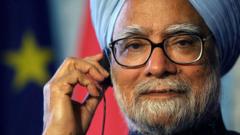Former Indian Prime Minister Manmohan Singh, whose death was announced last Thursday, left an indelible mark on India. Known for his quiet and gentle approach, he was often viewed as a kind and soft-spoken politician whose actions reshaped the country's trajectory. An official mourning period has been declared, culminating in a state funeral on Saturday.
Singh's career was illustrious, previously serving as the governor of India's central bank and federal finance minister before taking on the prime ministerial mantle for two terms. Despite his remarkable achievements, Singh was not a typical political figure, as he lacked the flamboyance characteristic of many politicians in India. He preferred to maintain a low profile, choosing silence during scandals that implicated his government, which evoked mixed reactions among the public.
His supporters admired his focused and pragmatic approach, valuing results over rhetoric, especially evident in the economic reforms he implemented as finance minister that integrated India into the global economy. Kapil Sibal, a contemporary of Singh in the Congress party, remarked on his integrity, noting, "I don't think anyone in India believes that Manmohan Singh can do something wrong or corrupt." Critics, however, accused him of being indecisive and lacking assertiveness, often laughing at his soft-spoken voice.
Singh's persona remained straightforward even as his peers adapted to the changing political landscape. His dignified response to various challenges, including corruption allegations that emerged during his tenure, demonstrated his character. Singh's rise from a humble background to the nation's first Sikh Prime Minister captured the admiration of millions, particularly within India's middle class.
In a groundbreaking move in 2005, Singh offered a public apology in parliament for the 1984 riots, which tragically claimed around 3,000 Sikh lives. This courageous act was seen as a reconciliation effort that endeared him to many, although some within the Congress party criticized it.
His leadership style was again recognized in 2008 when he negotiated a historic nuclear deal with the U.S., a decision that drew both support and criticism from various political factions. Yet, his calm and composed demeanor helped navigate the backlash while ensuring India was insulated from the global financial crisis that followed.
Singh's second term began with significant promise but was marred by accusations of corruption tied to various scandals. As his government's reputation waned, public sentiment turned against him, amplified by events such as the 2008 Mumbai terror attacks. Singh faced scrutiny for his handling of terrorism and socio-political movements during his tenure.
Despite his challenges, Singh gracefully opted not to seek a third term in 2014, asserting, "history will judge me more kindly than the contemporary media." Though the Congress party faced defeat in the elections, Singh's legacy as a principled leader who prioritized middle-class welfare and integrity endured.
In his time as prime minister, he worked to uplift the lives of many, advocating for salary increases for government employees and implementing essential educational and employment programs. While not without his flaws or controversies, Singh's legacy as a leader with profound resolve and principle continues to resonate within the heart of India.


















